- Home
- Shannon Messenger
Keeper of the Lost Cities
Keeper of the Lost Cities Read online
CONTENTS
PREFACE
CHAPTER ONE
CHAPTER TWO
CHAPTER THREE
CHAPTER FOUR
CHAPTER FIVE
CHAPTER SIX
CHAPTER SEVEN
CHAPTER EIGHT
CHAPTER NINE
CHAPTER TEN
CHAPTER ELEVEN
CHAPTER TWELVE
CHAPTER THIRTEEN
CHAPTER FOURTEEN
CHAPTER FIFTEEN
CHAPTER SIXTEEN
CHAPTER SEVENTEEN
CHAPTER EIGHTEEN
CHAPTER NINETEEN
CHAPTER TWENTY
CHAPTER TWENTY-ONE
CHAPTER TWENTY-TWO
CHAPTER TWENTY-THREE
CHAPTER TWENTY-FOUR
CHAPTER TWENTY-FIVE
CHAPTER TWENTY-SIX
CHAPTER TWENTY-SEVEN
CHAPTER TWENTY-EIGHT
CHAPTER TWENTY-NINE
CHAPTER THIRTY
CHAPTER THIRTY-ONE
CHAPTER THIRTY-TWO
CHAPTER THIRTY-THREE
CHAPTER THIRTY-FOUR
CHAPTER THIRTY-FIVE
CHAPTER THIRTY-SIX
CHAPTER THIRTY-SEVEN
CHAPTER THIRTY-EIGHT
CHAPTER THIRTY-NINE
CHAPTER FORTY
CHAPTER FORTY-ONE
CHAPTER FORTY-TWO
CHAPTER FORTY-THREE
CHAPTER FORTY-FOUR
CHAPTER FORTY-FIVE
CHAPTER FORTY-SIX
CHAPTER FORTY-SEVEN
CHAPTER FORTY-EIGHT
CHAPTER FORTY-NINE
ACKNOWLEDGMENTS
ABOUT THE AUTHOR
For Mom and Dad,
who always believed this day would come.
(And because I’m hoping imaginary grandchildren count!)
PREFACE
BLURRY, FRACTURED MEMORIES SWAM through Sophie’s mind, but she couldn’t piece them together. She tried opening her eyes and found only darkness. Something rough pressed against her wrists and ankles, refusing to let her move.
A wave of cold rushed through her as the horrifying realization dawned.
She was a hostage.
A cloth across her lips stifled her cry for help, and a sedative’s sweet aroma stung her nose when she inhaled, making her head spin.
Were they going to kill her?
Would the Black Swan really destroy their own creation? What was the point of Project Moonlark, then? What was the point of the Everblaze?
The drug lulled her toward a dreamless oblivion, but she fought back—clinging to the one memory that could shine a tiny spot of light in the thick, inky haze. A pair of beautiful aquamarine eyes.
Fitz’s eyes. Her first friend in her new life. Her first friend ever.
Maybe if she hadn’t noticed him that day in the museum, none of this would have happened.
No. She knew it’d been too late even then. The white fires were already burning—curving toward her city and filling the sky with sticky, sweet smoke.
The spark before the blaze.
ONE
MISS FOSTER!” MR. SWEENEY’S NASAL voice cut through Sophie’s blaring music as he yanked her earbuds out by the cords. “Have you decided that you’re too smart to pay attention to this information?”
Sophie forced her eyes open. She tried not to wince as the bright fluorescents reflected off the vivid blue walls of the museum, amplifying the throbbing headache she was hiding.
“No, Mr. Sweeney,” she mumbled, shrinking under the glares of her now staring classmates.
She pulled her shoulder-length blond hair around her face, wishing she could hide behind it. This was exactly the kind of attention she went out of her way to avoid. Why she wore dull colors and lurked in the back, blocked by the other kids who were at least a foot taller than her. It was the only way to survive as a twelve-year-old high school senior.
“Then perhaps you can explain why you were listening to your iPod instead of following along?” Mr. Sweeney held up her earbuds like they were evidence in a crime. Though to him, they probably were. He’d dragged Sophie’s class to the Natural History Museum in Balboa Park, assuming his students would be excited about the all-day field trip. He didn’t seem to realize that unless the giant dinosaur replicas came to life and started eating people, no one cared.
Sophie tugged out a loose eyelash—a nervous habit—and stared at her feet. There was no way to make Mr. Sweeney understand why she needed the music to cancel the noise. He couldn’t even hear the noise.
Chatter from dozens of tourists echoed off the fossil-lined walls and splashed around the cavernous room. But their mental voices were the real problem.
Scattered, disconnected pieces of thoughts broadcast straight into Sophie’s brain—like being in a room with hundreds of TVs blaring different shows at the same time. They sliced into her consciousness, leaving sharp pains in their wake.
She was a freak.
It’d been her secret—her burden—since she fell and hit her head when she was five years old. She’d tried blocking the noise. Tried ignoring it. Nothing helped. And she could never tell anyone. They wouldn’t understand.
“Since you’ve decided you’re above this lecture, why don’t you give it?” Mr. Sweeney asked. He pointed to the enormous orange dinosaur with a duckbill in the center of the room. “Explain to the class how the Lambeosaurus differs from the other dinosaurs we’ve studied.”
Sophie repressed a sigh as her mind flashed to an image of the information card in front of the display. She’d glanced at it when they entered the museum, and her photographic memory recorded every detail. As she recited the facts, Mr. Sweeney’s face twisted into a scowl, and she could hear her classmates’ thoughts grow increasingly sour. They weren’t exactly fans of their resident child prodigy. They called her Curvebuster.
She finished her answer, and Mr. Sweeney grumbled something that sounded like “know-it-all” as he stalked off to the exhibit in the next room over. Sophie didn’t follow. The thin walls separating the two rooms didn’t block the noise, but they muffled it. She grabbed what little relief she could.
“Nice job, superfreak,” Garwin Chang—a boy wearing a T-shirt that said BACK OFF! I’M GONNA FART—sneered as he shoved past her to join their classmates. “Maybe they’ll write another article about you. ‘Child Prodigy Teaches Class About the Lame-o-saurus.’”
Garwin was still bitter Yale had offered her a full scholarship. His rejection letter had arrived a few weeks before.
Not that Sophie was allowed to go.
Her parents said it was too much attention, too much pressure, and she was too young. End of discussion.
So she’d be attending the much closer, much smaller San Diego City College next year—a fact some annoying reporter found newsworthy enough to post in the local paper the day before—CHILD PRODIGY CHOOSES CITY COLLEGE OVER IVY LEAGUE—complete with her senior photo. Her parents freaked when they found it. “Freaked” wasn’t even a strong enough word. More than half their rules were to help Sophie “avoid unnecessary attention.” Front-page articles were pretty much their worst nightmare. They’d even called the newspaper to complain.
The editor seemed as unhappy as they were. The story was run in place of an article on the arsonist terrorizing the city—and they were still trying to figure out how the mistake had happened. Bizarre fires with white-hot flames and smoke that smelled like burnt sugar took priority over everything. E
specially a story about an unimportant little girl most people went out of their way to ignore.
Or, they used to.
Across the museum, Sophie caught sight of a tall, dark-haired boy reading yesterday’s newspaper with the embarrassing black-and-white photo of her on the front. Then he looked up and stared straight at her.
She’d never seen eyes that particular shade of blue before—teal, like the smooth pieces of sea glass she’d found on the beach—and they were so bright they glittered. Something flickered across his expression when he caught her gaze. Disappointment?
Before she could decide what to make of it, he shrugged off the display he’d been leaning against and closed the distance between them.
The smile he flashed belonged on a movie screen, and Sophie’s heart did a weird fluttery thing.
“Is this you?” he asked, pointing to the picture.
Sophie nodded, feeling tongue-tied. He was probably fifteen, and by far the cutest boy she’d ever seen. So why was he talking to her?
“I thought so.” He squinted at the picture, then back at her. “I didn’t realize your eyes were brown.”
“Uh . . . yeah,” she said, not sure what to say. “Why?”
He shrugged. “No reason.”
Something felt off about the conversation, but she couldn’t figure out what it was. And she couldn’t place his accent. Kind of British, but different somehow. Crisper? Which bothered her—but she didn’t know why.
“Are you in this class?” she asked, wishing she could suck the words back as soon as they left her mouth. Of course he wasn’t in her class. She’d never seen him before. She wasn’t used to talking to boys—especially cute boys—and it made her brain a little mushy.
His perfect smile returned as he told her, “No.” Then he pointed to the hulking greenish figure they were standing in front of. An Albertosaurus, in all its giant, lizardesque glory. “Tell me something. Do you really think that’s what they looked like? It’s a little absurd, isn’t it?”
“Not really,” Sophie said, trying to see what he saw. It looked like a small T. rex: big mouth, sharp teeth, ridiculously short arms. Seemed fine to her. “Why? What do you think they looked like?”
He laughed. “Never mind. I’ll let you get back to your class. It was nice to meet you, Sophie.”
He turned to leave just as two classes of kindergartners barreled into the fossil exhibit. The crushing wave of screaming voices was enough to knock Sophie back a step. But their mental voices were a whole other realm of pain.
Kids’ thoughts were stinging, high-pitched needles—and so many at once was like an angry porcupine attacking her brain. Sophie closed her eyes as her hands darted to her head, rubbing her temples to ease the stabbings in her skull. Then she remembered she wasn’t alone.
She glanced around to see if anyone noticed her reaction and locked eyes with the boy. His hands were at his forehead, and his face wore the same pained expression she imagined she’d had only a few seconds before.
“Did you just . . . hear that?” he asked, his voice hushed.
She felt the blood drain from her face.
He couldn’t mean . . .
It had to be the screaming kids. They created plenty of racket on their own. Shrieks and squeals and giggles, plus sixty or so individual voices chattering away.
Voices.
She gasped and took another step back as her brain solved her earlier problem.
She could hear the thoughts of everyone in the room. But she couldn’t hear the boy’s distinct, accented voice unless he was speaking.
His mind was totally and completely silent.
She didn’t know that was possible.
“Who are you?” she whispered.
His eyes widened. “You did—didn’t you?” He moved closer, leaning in to whisper. “Are you a Telepath?”
She flinched. The word made her skin itch.
And her reaction gave her away.
“You are! I can’t believe it,” he whispered.
Sophie backed toward the exit. She wasn’t about to reveal her secret to a total stranger.
“It’s okay,” he said, holding out his hands as he moved closer, like she was some sort of wild animal he was trying to calm. “You don’t have to be afraid. I’m one too.”
Sophie froze.
“My name’s Fitz,” he added, stepping closer still.
Fitz? What kind of a name was Fitz?
She studied his face, searching for some sign that this was all part of a joke.
“I’m not joking,” he said, like he knew exactly what she was thinking.
Maybe he did.
She wobbled on her feet.
She’d spent the past seven years wishing she could find someone else like her—someone who could do what she could. Now that she’d found him, she felt like the world had tilted sideways.
He grabbed her arms to steady her. “It’s okay, Sophie. I’m here to help you. We’ve been looking for you for twelve years.”
Twelve years? And what did he mean by “we”?
Better question: What did he want with her?
The walls closed in and the room started to spin.
Air.
She needed air.
She jerked away and bolted through the door, stumbling as her shaky legs found their rhythm.
She sucked in giant breaths as she ran down the stairs in front of the museum. The smoke from the fires burned her lungs and white bits of ash flew in her face, but she ignored them. She wanted as much space between her and the strange boy as possible.
“Sophie, come back!” Fitz shouted behind her.
She picked up her pace as she raced through the courtyard at the base of the steps, past the wide fountain and over the grassy knolls to the sidewalk. No one got in her way—everyone was inside because of the poor air quality. But she could still hear his footsteps gaining on her.
“Wait,” Fitz called. “You don’t have to be afraid.”
She ignored him, pouring all her energy into her sprint and fighting the urge to glance over her shoulder to see how far back he was. She made it halfway through a crosswalk before the sound of screeching tires reminded her she hadn’t looked both ways.
Her head turned and she locked eyes with a terrified driver struggling to stop his car before it plowed right over her.
She was going to die.
TWO
THE NEXT SECOND WAS A BLUR.
The car swerved right—missing Sophie by inches—then jumped the curb and sideswiped a streetlight. The heavy steel lantern cracked from its base and plummeted toward Sophie.
No!
It was her only thought as her instincts took over.
Her hand shot into the air, her mind pulling strength from somewhere deep in her gut and pushing it out through her fingertips. She felt the force collide with the falling lantern, gripping on like it was an extension of her arm.
As the dust settled she looked up, and gasped.
The bright blue lantern floated above her, somehow held up by her mind. It didn’t even feel heavy, though she was sure it weighed a ton.
“Put it down,” a familiar, accented voice warned, bringing her out of her trance.
She shrieked and dropped her arm without thinking. The streetlight hurtled toward them.
“Watch out!” Fitz shouted, yanking her out of the way a split second before the lantern crashed to the ground. The force of the impact knocked them over, and they tumbled to the sidewalk. Fitz’s body broke her fall as she landed across his chest.
Time seemed to stop.
She stared into his eyes—eyes that were now stretched as wide as they could go—trying to sort through the flurry of thoughts and questions swirling around in her head to find something coherent.
“How did you do that?�
�� he whispered.
“I have no idea.” She sat up, replaying the past few seconds in her mind. Nothing made sense.
“We need to get out of here,” Fitz warned, pointing to the driver, who was staring at them like he’d witnessed a miracle.
“He saw,” she gasped, feeling her chest tighten with panic.
Fitz pulled her to her feet as he got up. “Come on, let’s get out of sight.”
She was too overwhelmed to figure out a plan on her own, so she didn’t resist when he dragged her down the street.
“Which way?” he asked when they reached the first intersection.
She didn’t want to be alone with him, so she pointed north, toward the San Diego Zoo, where there was sure to be a crowd—even during a firestorm.
They took off running, though no one was following, and for the first time in her life, Sophie missed hearing thoughts. She had no idea what Fitz wanted—and it changed everything. Her mind ran through terrifying scenarios, most of which involved government agents throwing her into dark vans to run experiments on her. She watched the road, ready to bolt at the first sign of anything suspicious.
They reached the zoo’s massive parking lot, and Sophie relaxed when she saw people outside, milling around their cars. Nothing would happen with so many witnesses. She slowed her pace to a walk.
“What do you want?” she asked when she caught her breath.
“I’m here to help you, I promise.”
His voice sounded sincere. Didn’t make it easier to believe him, though.
“Why were you looking for me?” She tugged out a loose eyelash, more than a little afraid of the answer.
He opened his mouth, then hesitated. “I’m not sure if I’m supposed to tell you.”
“How am I supposed to trust you if you won’t answer my questions?”
He considered that for a second. “Okay, fine—but I don’t know much. My father sent me to find you. We’ve been looking for a specific girl your age, and I was supposed to observe and report back to him, like always. I wasn’t supposed to talk to you.” He frowned, like he was disappointed with himself. “I just couldn’t figure you out. You don’t make sense.”
“What does that mean?”

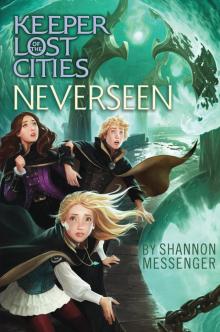 Neverseen
Neverseen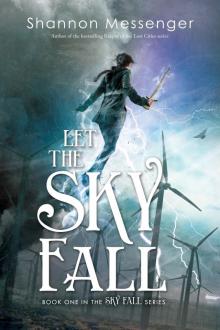 Let the Sky Fall
Let the Sky Fall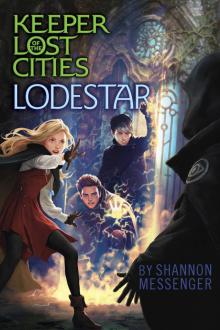 Lodestar
Lodestar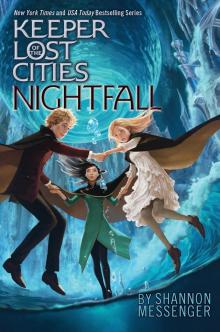 Nightfall
Nightfall Exile
Exile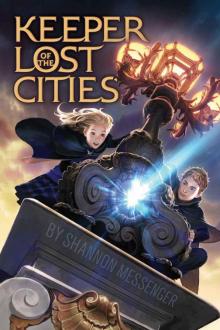 Keeper of the Lost Cities
Keeper of the Lost Cities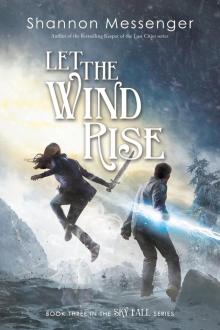 Let the Wind Rise
Let the Wind Rise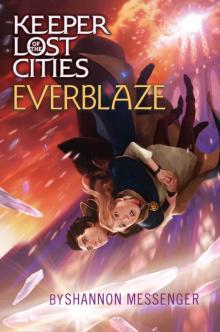 Everblaze
Everblaze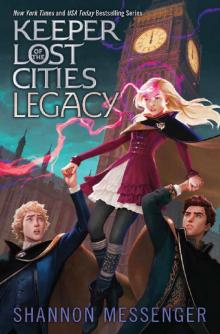 Legacy (Keeper of the Lost Cities Book 8)
Legacy (Keeper of the Lost Cities Book 8)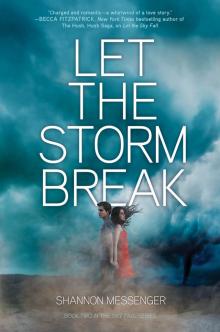 Let the Storm Break
Let the Storm Break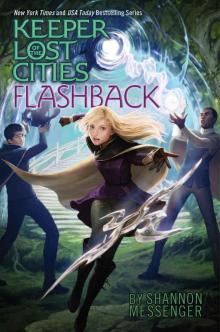 Flashback (Keeper of the Lost Cities Book 7)
Flashback (Keeper of the Lost Cities Book 7)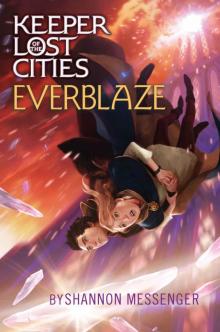 Everblaze (Keeper of the Lost Cities Book 3)
Everblaze (Keeper of the Lost Cities Book 3)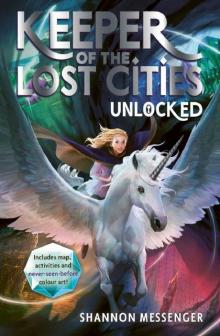 Unlocked 8.5 (Keeper of the Lost Cities)
Unlocked 8.5 (Keeper of the Lost Cities)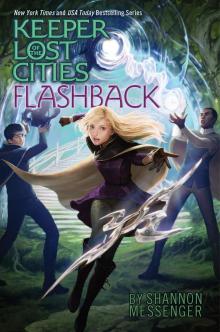 Flashback
Flashback